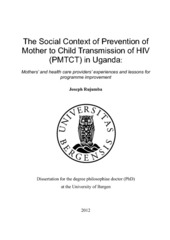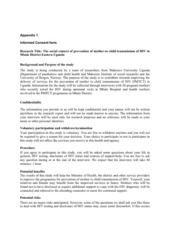| dc.contributor.author | Rujumba, Joseph | en_US |
| dc.date.accessioned | 2013-01-18T11:14:31Z | |
| dc.date.available | 2013-01-18T11:14:31Z | |
| dc.date.issued | 2012-11-27 | eng |
| dc.identifier.isbn | 978-82-308-2158-9 | en_US |
| dc.identifier.uri | https://hdl.handle.net/1956/6277 | |
| dc.description.abstract | Introduction: The prevention of mother-to-child transmission of HIV (PMTCT) programme has been operational in Uganda since the year 2000, but its performance remains sub-optimal. The objective of this thesis is to increase understanding of the role of the social context in the delivery and utilization of PMTCT services, focusing on how pregnant women experience routine HIV counselling and testing as part of antenatal care, HIV status disclosure to partners and lessons leant by health care providers, to inform strategies for improving the effectiveness of the programme. Methods: This was a qualitative study conducted in 2010 in Eastern Uganda. We conducted 1) indepth interviews with 30 pregnant women (15 HIV positive and 15 HIV negative) attending the antenatal clinic at Mbale Regional Referral Hospital, 2) key informant interviews with 6 health workers involved in providing antenatal care and HIV counselling and testing at the same hospital; and 3) 24 individual interviews with health workers involved in the PMTCT programmes at 10 health care facilities and 4 key informant interviews with district officials and The AIDS Support Organisation Mbale (TASO). We did observations at the antenatal clinics at 2 TASO clinics and at Mbale Hospital. The content thematic approach was used for data analysis. Results: Most women knew that the hospital provided HIV counselling and testing services as part of antenatal care (ANC) prior to attending the current ANC visit. Most women perceived HIV testing within the ANC as a compulsory procedure, a belief that was re-enforced by health workers’ downplay of the opt-out option during health education and counselling sessions. In general, most women viewed routine HIV testing as beneficial by enabling those who test HIV positive to access PMTCT services and HIV treatment. Most women who tested HIV positive were satisfied with the immediate counselling they received. However, they identified the need for follow-up and supportive counselling to cope with the fears and the stigma of living with HIV. Some HIV negative women mentioned that the post-test counselling they received was inadequate. All HIV negative women reported that they had disclosed their HIV status to their sexual partners but expressed need for support to convince their partners to undergo HIV testing. Women reported that their partners often assumed that they were equally HIV negative (testing by proxy). Most of the HIV positive women had not disclosed their HIV status to their sexual partners for fear of abandonment, violence and accusation of bringing HIV infection into the family. However, the few positive women who disclosed their status generally experienced positive responses from their sexual partners. The key lessons for programme improvement were: ensuring constant availability of critical PMTCT supplies, regular in-service training of health workers to keep them abreast with the rapidly changing knowledge and guidelines for PMTCT, ensuring that lower level health centres provide maternity services and ARVs for women in the PMTCT programme and that they had adequate facilities for effective follow-up and support for mothers. | en_US |
| dc.language.iso | eng | eng |
| dc.publisher | The University of Bergen | eng |
| dc.relation.haspart | Paper I: Rujumba, Joseph, Neema, Stella, Tumwine, James K., Tylleskär, Thorkild and Heggenhougen, Harald K. Pregnant women’s experiences of routine counselling and testing for HIV in Eastern Uganda: A qualitative study. BMC Health Services Research 2013, 13:189, May 2013. The article is available at: <a href="http://hdl.handle.net/1956/7919" target="blank">http://hdl.handle.net/1956/7919</a> | en_US |
| dc.relation.haspart | Paper II: Rujumba, Joseph, Neema, Stella, Byamugisha, Robert, Tylleskär, Thorkild, Tumwine, James K. and Heggenhougen, Harald K. (2012) “Telling my husband I have HIV is too heavy to come out of my mouth”: pregnant women’s disclosure experiences and support needs following antenatal HIV testing in Eastern Uganda. Journal of the International AIDS Society 2012, 15:17429, August 2012. The article is available at: <a href="http://hdl.handle.net/1956/6275" target="blank">http://hdl.handle.net/1956/6275</a> | en_US |
| dc.relation.haspart | Paper III: Rujumba, Joseph, Tumwine, James K, Tylleskär, Thorkild, Neema, Stella and Heggenhougen, Harald K. (2012) Listening to health workers: lessons for strengthening the programme for the prevention of mother-to-child transmission of HIV in Mbale District, Eastern Uganda. BMC Health Services Research 2012, 12:3, January 2012. The article is available at: <a href="http://hdl.handle.net/1956/6276" target="blank">http://hdl.handle.net/1956/6276</a> | en_US |
| dc.title | The Social Context of Prevention of Mother to Child Transmission of HIV (PMTCT) in Uganda: Mothers’ and health care providers’ experiences and lessons for programme improvement | en_US |
| dc.type | Doctoral thesis | |
| dc.description.version | publishedVersion | en_US |
| dc.rights.holder | Copyright the author. All rights reserved | |

